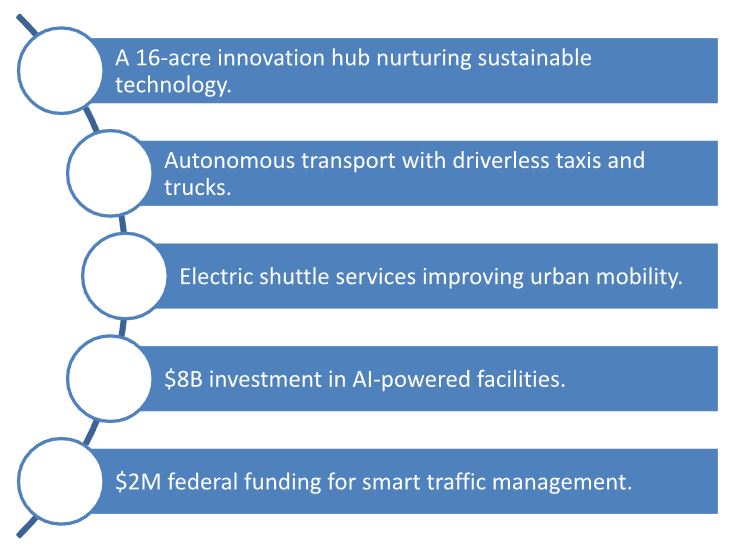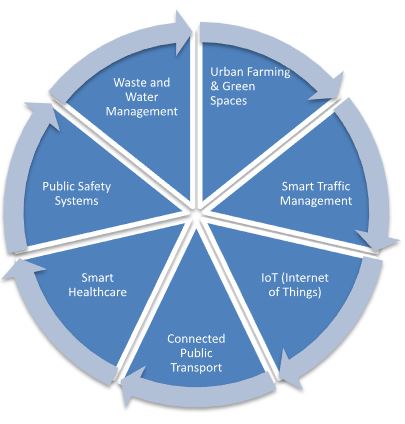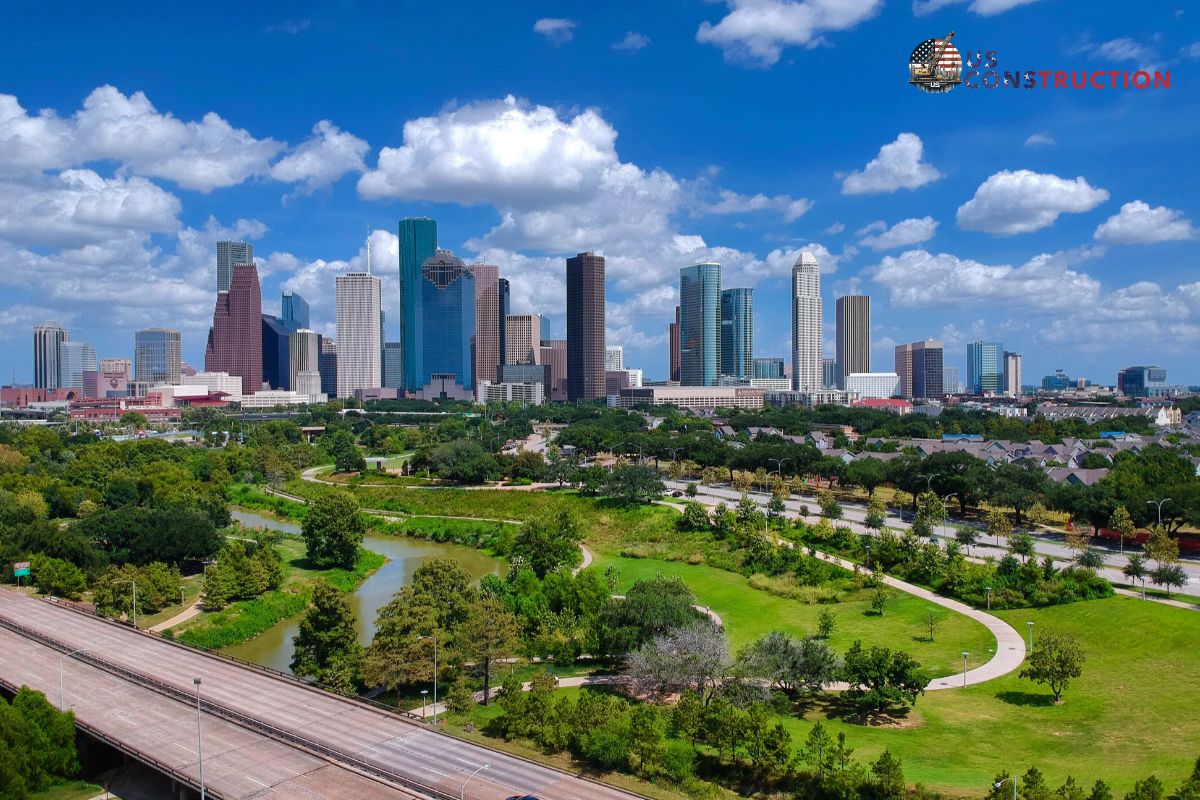Urban development is evolving to smart city models to meet future emerging challenges. The expectations for sustainability and tech-driven innovations that fuel smart ideals in the construction industry are increasing. Here, we describe the future trends of general contractor in HOUSTON, TEXAS and smart cities.
With smarter solutions, licensed general contractors in HOUSTON, TEXAS must integrate cutting-edge technologies and complex environmental regulations. US Construction is at the forefront of urban transformation from simple living spaces to updated designs. We incorporate greener practices and energy-efficient materials in our structures. Some facts about smart cities in Houston:

What Is Meant by Smart Cities?
A smart city is an advanced urban development model that enhances citizens’ quality of life with AI-generated support. These developments are connected to managing resources for more effective and energy-saving designs. The general contractors conserve utility supplies usage, manage traffic with smart solutions, and digitalize other commodities. They make living spaces easier, safer, and more environmentally friendly.
Core Features and Technologies of Smart Cities

Smart towns aim to make urban regions greener, more accessible, and more efficient for everyone by utilizing these technologies.
Common Trends in Smart Cities in the Houston, TX
Several themes have emerged as communities worldwide transform into smart cities. These cities are the real-time demonstration of innovation. These developments change the lifestyle and their impact on mother nature. The general contractor in HOUSTON, TX are responsible for making these ideas a reality.
Sustainable Construction Practices
Sustainability is a primary concern in modern urban settings. These designs reduce construction footprints and save natural resources. The general contractors use greener materials and fixtures to manage electricity consumption.
Moreover, water conservation strategies are integrated at the initial stages. The general contractors strictly follow regulatory measures. These approaches make them more trustworthy and reputed in markets.
Integration of Smart Infrastructure
IoT (Internet of Things) devices are installed in the design stage to connect and communicate the data to make decisions. Moreover, the interlinked infrastructures are coordinated with secure network systems.
Only experienced developers can install automation and incorporate cutting-edge technologies like LED lights, automated traffic control, and surveillance cameras.
Urban Transportation Solutions
One essential component of smart cities is safe and effective transportation controlled with innovative technologies. Cities prioritize convenient, environmentally friendly transport choices. Therefore, electric charging stations replace traditional gasoline points. Moreover, digital screening systems are introduced to manage traffic flow.
Contractors are building roads and smart parking systems prepared for driverless vehicles. These tactics protect the environment and are flexible to future needs.
Data Analytics & Smart Governance
In smart cities, the management of all installations and utilities is streamlined with real-time data analysis. The data is collected from smart sensors, CCTV cameras, and other sources. These developments are secured right from theft control to regulating waste management practices.
General contractors in corporate data centers and set up networks. These facilities are safe and advanced enough to process data in bulk amounts. Moreover, information for more intelligent urban management depends on reliable infrastructure layouts.
Resilience to Climate Change
In Houston, local conditions require developers to focus on resilient infrastructure. This approach is becoming increasingly crucial to controlling climatic changes. Moreover, the designs are weather-resistant to guard against severe weather. Likewise, the planning of emergency and restoration activities is paramount.
Resilience characteristics must be incorporated into new construction and renovation of existing structures. For more secure approaches, the contractors should incorporate effective stormwater management systems. Moreover, the rainwater collection systems must survive severe weather events.
Smart Energy Systems
Indeed, greener practices are a reliable solution for regulating utility consumption and reducing the carbon footprints of smart cities.
In addition to implementing smart grids that enable improved electricity distribution and administration, the general contractors are essential in installing alternative power stations. They use wind turbines and solar panels to cut down on carbon emissions. They also retrofit older structures with improved fixtures that meet regulations.
Digitalization of Public Services
Digitalizing smart cities for utility bill payment, smart medical facilities, and virtual city halls. These innovations enhance citizens’ quality of life and ease of access to public services.
The infrastructure needed to host these services is integrated in the initial phases. The general contractors develop the data centers and other smart control systems to streamline executions. The key implementation measure is ensuring these structures are designed for digital integration.
Challenges Contractors Face While Developing Smart Cities
Creating smart cities is a massive operation for general contractors and presents numerous challenges. These obstacles include intricate administrative, monetary, and regulatory elements in addition to technical ones. When creating smart cities, general contractors encounter the following major barriers:
Integration of Advanced Technologies
Integrating reliable and expandable technology is crucial to meeting future demands. However, it can be challenging for contractors to integrate novel innovations into the current infrastructure.
The capacity of smart city technologies to operate as intended may be hampered. The major causes are data inefficiencies and communication failures.
Complexity of Collaboration
Close cooperation between architects, planners, technological experts, and local government is necessary to create a smart city. Combining all the resources to work toward the same goal might be challenging.
Inadequate coordination may result in delays, misunderstandings, and increased expenses. Systems that lack synergies fail to produce the intended results.
High Initial Costs
Building smart cities requires a large initial investment in cutting-edge materials and high-tech installations. They have separate data centers and electricity networks. Contractors may find these expenses burdensome. Budgetary restrictions may restrict the project’s size and limit its use of advanced technologies.
Rapid Technological Changes
Technology is changing quickly, and the use of 5G networks and AI-driven systems makes older technologies obsolete. Staying competitive in these rapid transformations could be a real burden, and future investments in redesigns or improvements may be required.
Regulatory and Compliance Issues
Building codes might not be designed to support the cutting-edge technology utilized in smart city initiatives. Moreover, sustainability and environmental regulations can also add complexity.
Project delays and cost increases might result from navigating administrative red tape. Contractors have to face different jurisdictions.
Sustainability Considerations
One of the most crucial elements is sustainability conformity. However, it’s not always easy to balance societal and financial demands. General contractor’s use of materials and techniques is kept to a minimum.
The city’s ultimate goals may be threatened if sustainable practices are not implemented. Furthermore, the growing price of environmentally friendly materials may make it challenging.
Cybersecurity Risks
In fact, their extensive reliance on interconnected infrastructure makes them susceptible to cyberattacks. When implementing sensitive technology, contractors face the issue of data protection and storage.
A cybersecurity incident can result in data theft, system failures, and a decline in citizen trust. Contractors need to collaborate with cybersecurity specialists.
Scalability and Future-Proofing
Careful planning is necessary because this infrastructure can develop within the city. Systems and technologies need to be built with prospective expansion in mind. Failing to meet future requirements as the city expands may necessitate expensive retrofits.
Best General Contractors in HOUSTON, TEXAS Near Me
If you want the latest developments in smart cities integrated with advanced technologies, contact Houston’s general contractors for sustainable urban environments. Your projects will be secure if you embrace advancements like AI-powered structures, green building techniques, and connectivity to the Internet of Things. US Construction provides innovative construction trends that will reshape future demands.


Leave A Comment